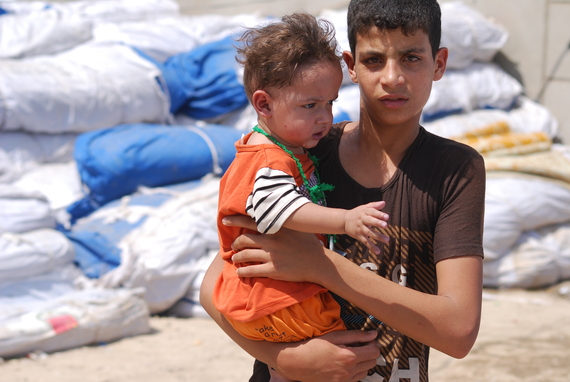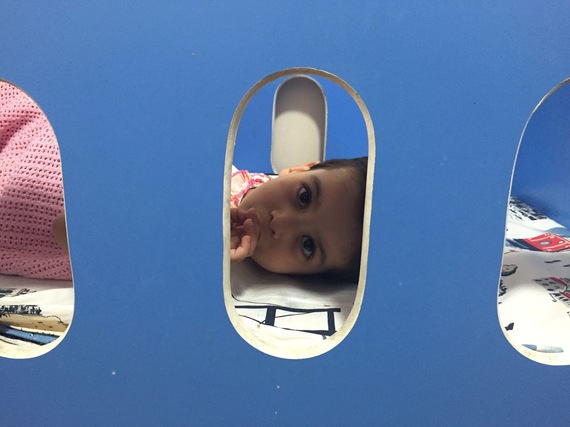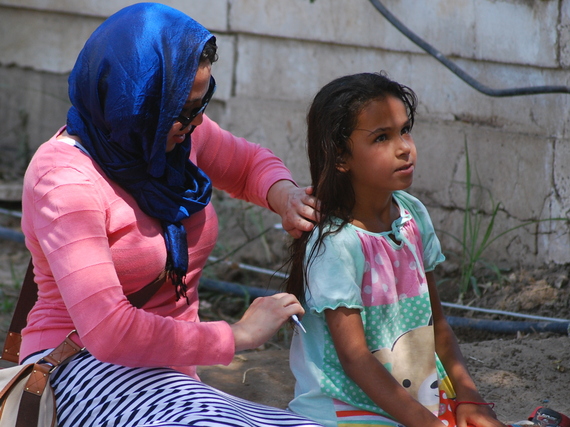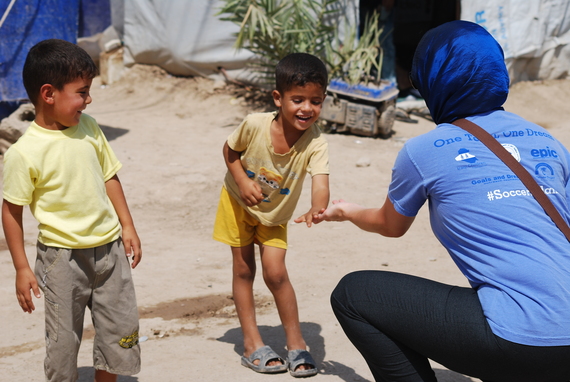It was nearly impossible to stand still outside in Baghdad in late July with the temperature rising over 120 degrees. The leather soles of my shoes became gummy as they melted -- I danced in place to avoid burning my feet. We were in a government-run orphanage in the center of Baghdad, looking into the faces of some of the 1 million war orphans that Iraq is struggling to save amid chaos and destruction. Chaos and destruction that we, Americans, helped create. Orphans that we helped create. The infant room in the orphanage was lined with pink and blue cribs, 3 deep, 5 across. At first glance, it looked like an ordinary daycare, children wrapped in blankets, one thumb in their mouths, the other holding a stuffed animal. There is nothing ordinary, however, about this place. There is only one adult for all of the babies in those cribs. The infants are eerily silent, just as the toddlers are in the room next door, sitting in neat rows only ever seen in the illustrations of a Madeline storybook. Their eyes are full of longing, though otherwise empty. These infants are the survivors.
I reached into the first crib, the one closest to the door, and picked up a little girl. She was probably about 9 months old, laying on her back in a blue and white dress, her enormous brown eyes staring up at me. As I raised her to my shoulder, her fingers curled around the back of my neck, clinging so tightly that if I had stopped supporting her, she wouldn't have budged. I'm not sure who was holding whom. She was so desperate to be in my arms. She was a survivor. I was in Baghdad on behalf of The Children's Village in conjunction with the Iraqi Children Foundation at the invitation of the Minister of Labor and Social Affairs to work on the Internally Displaced Persons (IDP) and orphan crisis -- the crisis of the survivors. Our mission was to see the IDP camps and orphanages, and build relationships with NGOs, government, and religious leaders -- learn how to best apply our expertise in helping at-risk children in Brownsville and the South Bronx to the loneliest and most vulnerable children of Baghdad. A 28-year old New York woman with low profile security traversing the city and avoiding the International (Green) Zone at all costs. The best estimates indicate Iraq has approximately 800,000 orphans (2012 UNICEF report)*, many orphaned either directly or indirectly by the American war and ensuing sectarian violence, and an additional 1.5 million IDPs (50 percent of whom are children), who have fled their homes due to conflict, predominantly with ISIS. These people are the survivors. The refugees. These children, with their big brown eyes and tight-fisted grasps, are the ones that nobody wants.
On our first visit to an IDP camp, where 75 families were living in a field outside a mosque, unsheltered from the blazing heat, there was a woman sitting in a sliver of shade combing the hair of her youngest child. Her three other children surrounded her on the ground waiting their turn. I sat down next to them, putting out my hand for the oldest child, about 10-years old. She trusted me, though I didn't even know how to say hello in Arabic, and the corners of her mouth curled into a hesitant smile as she placed the comb in my hand and scooted into my lap.
I combed her long, sweat-soaked hair into a thick braid. When I finished, I patted her shoulders indicating that she could move away. Instead, she leaned into my chest and looked over her shoulder, deep into my eyes, with a toothy smile. She held my hand for the duration of my visit, wrapping her arms around my neck and planting kisses on each of my cheeks as I slipped into the backseat of the Land Cruiser to be whisked away to yet another unidentified location.
On our fifth day in Baghdad, I was reminded to tighten my headscarf to cover a single unruly curl as I was the first American woman to ever be ushered into Grand Ayatollah Hussein Al-Sadr's private home. The Ayatollah talked about the problems of government leaders using religion for their own personal gain, reminding us that it is the responsibility of humans to care for humans because God created and loves all people. He said the God of love requires us to love one another, regardless of religion.
He talked about the high number of orphans in the country and the need for international support because the corrupt Iraqi government will fail. He also called for the need to conduct an international assessment of the orphan crisis since ISIS' recent incursions, because surely the numbers are beyond our outdated conservative estimates. As the heat in Baghdad boiled in the days after I returned to New York, I stayed awake at night contemplating the probability that the smiling, laughing, affectionate child whose hair I braided, who had fled ISIS and left her life behind, was left to bake in the dry, dirty field where I braided her hair only days before. My days in Baghdad were spent holding children, laughing with them, sitting in the dirt and playing patty cake with them. I smiled a lot, because I don't speak a word of Arabic and a smile and outstretched hand were all I was able to offer. But the days were also filled with sadness and doubt, the harsh reality is that the children whom I held in my arms, the children who had survived so much, are struggling to survive in a world that doesn't want or welcome them.
These children survived American war and ISIS. As Americans, we were quick to make orphans, but we were quicker to turn away and leave them in crowded cribs and lonely rooms and dirty fields. It is the responsibility of humans to care for humans.
On Thanksgiving morning, I received the following message from a dear Iraqi friend, my habibti, that offers a good place for us Americans to begin taking responsibility. This friend, a Muslim, a beautiful, feisty wife and mother and fearless advocate for her country's women and children wrote:
My prayer is hesitant, as I am not sure what to ask God for. I know it is PEACE but the questions is how [...] I guess my prayer will be for the U.S. people this time and not for Iraq. I pray for the U.S. people to choose well their leadership. Your leadership will have direct impact on me and my beloved's lives.
"For these are all our children. We will prosper or pay for whatever they become." (James Baldwin)
To learn more about how to help the Iraqi children, check out the Iraqi Children Foundation.
*Estimates vary between 800,000 orphans (2012 UNICEF report) and 4.5 million orphans, partly because the Iraqi's consider a child orphaned when they have lost one, not both, parents, and largely because field surveys are time consuming and difficult to conduct in the current climate.




